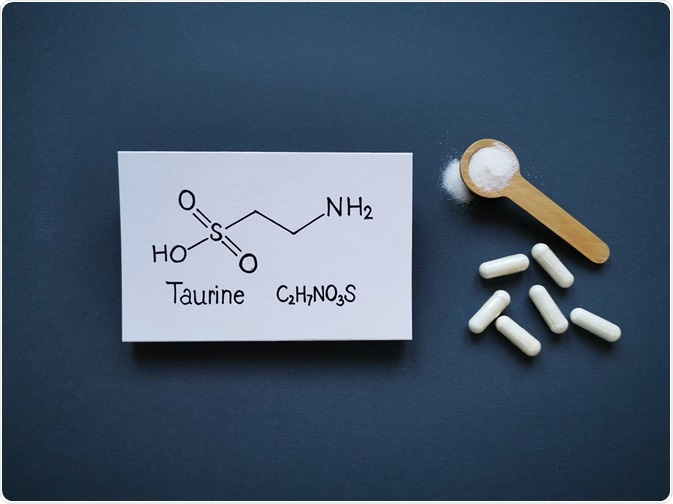Taurine, also known as aminoethane sulfonic acid, is a ubiquitous compound that is classified as an amino acid, although it is unable to form peptide bonds. Taurine is involved in several physiological processes in the body and is thought to have significant effects on the cardiovascular system and central nervous system (CNS), in addition to other areas of the body.

Image Credit: Danijela Maksimovic / Shutterstock.com
Cardiovascular system
Taurine is thought to play a vital role in the maintenance of the cardiac muscles and their normal function of contraction. This is believed to be due to the observation of cardiomyopathy upon the depletion of taurine in the body. Further research has supported this notion, showing that calcium ion transporters and modulation have an effect on the amino acid. Protein kinases and phosphatases in the cardiac muscle are also modulated by taurine.
Additionally, taurine is thought to play a role as a regulator of osmolality of the heart and oxidative stress. The mechanism for this regulation is not clear, however, and is questioned by some researchers. The stabilization of membranes may also be stabilized by the interaction of taurine with phospholipids.
CNS
Taurine is able to cross the blood-brain barrier and is linked to several physiological functions as a result of the way it interacts with the CNS.
Taurine is an agonist of the regulatory gamma-aminobutyric acid (GABA) neurotransmitter receptors in the thalamus of the brain, which activates inhibitory pathways. This has been suggested to carry a protective effect against excitotoxicity associated with high levels of glutamate.
Additionally, taurine has an effect on potentiation in the hippocampus, the stabilization of membranes, and the inhibition of macrophage feedback. This compound also works as an anxiolytic and is thought to modulate the glycine receptor.
Defections in the blood flow to the nerves and the resulting conduction of nerve signaling may be influenced by taurine. This has been suggested by a study of neuropathic rats but has yet to be examined in a human population.
Skeletal muscles
Taurine is needed for the normal function of skeletal muscle. To this end, a genetic deficiency in taurine has been associated with a depletion of skeletal and cardiac muscle. As a result, exercise capacity is also limited in individuals with low levels of taurine.
Antioxidant properties
As an antioxidant, taurine is able to neutralize some harmful substances in the body, such as lead and cadmium, producing a protective effect. Additionally, taurine supplementation helps to reduce oxidative stress brought on by intensive exercise and training.
Diuretic effect
Taurine also interacts with sodium, potassium, and magnesium ions, leading to the containment of potassium and magnesium inside the cell and the prevention of excessive sodium entry. As a result of this, taurine has a diuretic effect.
Glucose and adipose tissue regulation
Some animal studies have shown a link between taurine, weight loss, and blood glucose reductions. A study of rabbits showed that serum glucose levels were lowered by 30% with taurine supplementation.
However, no effect of insulin secretion or sensitivity has been evident in human studies to date. Nonetheless, taurine continues to be studied as a possible supplement in the management of diabetes and overweight individuals.
References
Further Reading
Last Updated: Jun 19, 2023